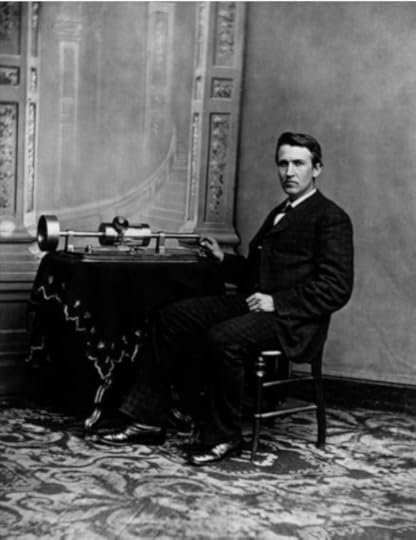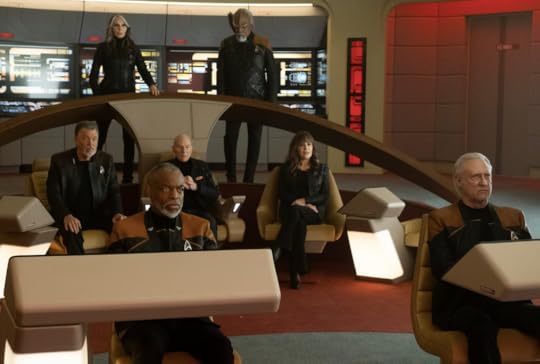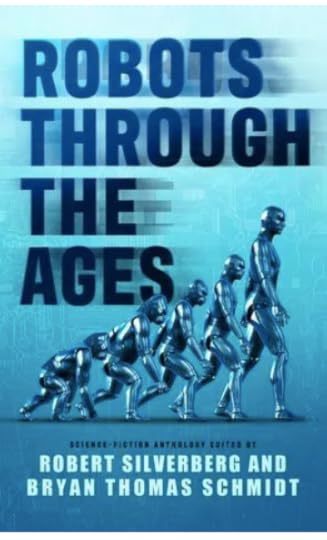Paul Levinson's Blog: Levinson at Large, page 35
June 16, 2023
Silo 1.8: What Really Happened?

A stunning ending to the excellent episode 1.8 of Silo up today on Apple TV+. And I won't say anything more until I alert you about the Big Spoilers ahead ...
***
Ok, the question is what happens to Juliet when she jumps off the railing, in her attempt to escape Holland and Sims and their fascist goons?
Let me again say that I haven't read any of Hugh Howey's books upon which this series is based, so I honestly don't know what will happen next.
And I'll also say that, in general, I tend to believe that unless you see a character's head severed or blown off, there's alway a chance that the character survived. But ... that's what I said when Marnes was shot, and he indeed died. And I also thought that Holston and even his wife perhaps survived when they got outside, and, so far, at least, they didn't. The point here is that so far in this superb 1984-like series, people who seem close to death always have died.
But I do think Juliet is different. Also, she knows the depths of the silo like the back of her hand. And, also, she broke free of Billings precisely because she didn't want to go outside to die. So I'm betting she knows a ledge on the way down that she can get a grip on, stop her fall, and move on to safety. We'll see what happens next week.
Meanwhile, another thing I really liked about this episode is that it cleared her father. He didn't go to the authorities with info about what his wife, Juliet's mother, was doing. They found out what she was doing via their spying cameras. And, while we're at it, Billings seems to be a fairly good guy, too.
Which is a very good thing, because with the Mayor revealed as bad, there are some powerful forces now out to kill Juliet.
I'll see you back here next week with my next review. I'm glad about the news that Silo was renewed for a second season. This is powerful science fiction indeed.
See also Silo 1.1-1.2: A Unique Story, Inside and Out ... Silo 1.3: Like Chernobyl, Repaired ... 1.4: Truth, Not Quite ... 1.5: Revelations ... 1.6-1.7: The Book and the Water
June 15, 2023
Star Trek: Strange New Worlds 2.1: Nurse Chapel

Great to see Star Trek: Strange New Worlds back today with the first episode of its second season, even if it has little of Pike, who may be becoming my favorite Star Trek captain. I should add, Strange New Worlds is already my favorite new Star Trek series.
And episode 2.1 does have Spock (Ethan Peck) and M'Benga (Babs Olusanmokun) in the spotlight. So why did I put just Nurse Chapel (Jess Bush) in the title? Because she's in the best scenes with Spock and the ship's doctor, and in fact is the glue that holds the whole episode together.
[Ok, more spoilers ahead ... ]
Spock is acting in command, and takes the Enterprise to a place in space where the Klingons and humans alternate being in control, and it's now the Klingons' turn. Spock disobeys an admiral's order to go there, and that's a good sign about what kind of leader he is becoming.
Of course, the Admiral isn't wrong that the Enterprise going there could provoke a war with the Klingons, and M'Benga and Chapel have to fight off a whole bunch of them to make good their escape. How do they do this? By taking some drug -- a guess akin to a super steroid -- that gives them almost super powers. But the drug doesn't last too long, and their fight with the Klingons starts off this second season with some fine action scenes.
They escape, barely with their lives, and the scenes with Spock and Chapel are another kind of excellent. Spock has tears in eyes as he sees Chapel survived, and what she says to Spock shows she clearly loves him. In terms of continuity with TOS, did Chapel and Spock love each other back in our 1960s? I'm not sure, but I don't care. They two are an emerging great couple now in SNW, and I look forward to seeing more of that.
Which I expect will happen, and I'll be watching and reviewing every episode.
See also Star Trek: Strange New Worlds 1.1-1.2: Great Characters, Actors, Stories ... 1.3: "Instead of terraforming planets, we modify ourselves ..." ... 1.4: The Gorn and the Wub ... 1.5 Going to the Chapel ... 1.6: Two Stories ... 1.7: The Kiss ... 1.8: Ends of the Continuum ... 1.9: Momentous! ... 1.10: Everything!
June 14, 2023
Why the Final Beatles Record via AI Will Be Great, But Not So Revolutionary

Edison and his first phonograph
Everybody's talking about Paul McCartney's comment in a BBC interview that AI was used in the creation of the "last" Beatles record, based on a demo John Lennon made in the 1970s, and already worked on by the surviving Beatles -- Paul, George, and Ringo -- in the 1990s, when The Beatles released two other Lennon demos they worked on, "Real Love" and "Free As A Bird". I'm really looking forward to this new record, to be released last this year, but I expect it won't be very much different in production and outcome than in any other Beatles recordings released in the past few years, including the beautiful things Peter Jackson did to the Beatles recordings from their 1969 rooftop concert and a little before in Jackson's 2021 documentary, "The Beatles: Get Back."
Let's go back to the history of recording to understand why AI use in these recordings is not such a big deal. If Frank Sinatra hit a bad note, or wanted to change anything in his studio recording of "That Old Black Magic," which would appear on his second studio album, released on Columbia Records in 1947, he would have needed to go back into the studio and record the whole song again. By the 1960s, when The Beatles began recording, that already was not necessary. Splices could easily be made in the recording tape, so the correct note could replace the off-key note, and by the end of the decade and the beginning of the 1970s even that was not necessary. All splicing could be done electronically, and as the number of "tracks" that were used in a recording quickly expanded from 4 to 8 to 16 and more, doing harmony to your own voice became easy and commonplace. None of that was called or even considered to be recordings made by AI. The were recordings made by human beings, using ever more sophisticated technology,
By the 21st century and increasing in the past two decades, digital correction of flat notes and production of harmonies without the singer needing to put down another track became ubiquitous in recording. Even in the 1990s, producer Jeff Lynne did all kinds of electronic magic on Lennon's vocals to make them compatible with the new voices Paul and George were putting on "Real Love" and "Free As A Bird". None of that was thought or said to be the least bit worrisome. These developments were just more of the same tech advances which had been foreseen almost since the day Thomas Edison rolled out his first phonograph -- which recorded on tin foil -- back in 1877. He'd intended that to be used as a recording device for the telephone (invented by Alexander Graham Bell a year earlier in 1876) and didn't foresee its mass adoption as a music recording player. But the world soon did, and gave Edison the name of "The Wizard of Menlo Park" (New Jersey, where Edison invented the record player).
History is always worth consulting, and especially useful in putting new developments into perspective. It may be exciting to be concerned about our increasing use of AI in so much that we do, but the Greek chorus of criticism that we hear about every new use of AI these days is misplaced. In reality, it's actually about things that AI does in science fiction, and is itself a kind of science fiction.
I'll sit back and listen to this new Beatles recording with no concern at all, and nothing but pleasure, grateful that Yoko sent cassette recording by John to Paul in the 1980s, and we now have the technology to make it sound fully alive.
"It's Real Life" -- an alternate history aboutThe Beatles -- read it for FREE here
June 10, 2023
Silo 1.6-1.7: The Book and the Water

I'm reviewing episodes 1.6 and 1.7 of Silo together because they're very closely related, and revolve around two themes: the book and the water.
[Spoilers ahead ... ]
Episode 1.6 has Juliette discovering and devouring a relic that provides a key piece of the hidden truth: a book, with pictures of the outside world, including, especially, the ocean. Being on Cape Cod, this immediately resonated with me. There's truth indeed in any big body of water, and especially when the reader is living in a silo. And there's a whole tradition in our off-screen world of books being conveyors of repressed truths, ranging from Station Eleven to, of course, 1984. Silo has echos of 1984 already, and you can add that great dystopian novel to Westworld (listen to the music in Silo), a dystopian television triumph, until its final season.
And in episode 1.7 Juliet briefly rescues Gloria, who gave that book to George's mother, who in turn gave it to her son. The episode is entitled "The Flamekeepers," and that's who Gloria and George's mother were. And now -- as Gloria tells Juliette -- Juliet is their standard bearer.
The heroes and villains are this story are slowly coming into focus. In addition to everyone who went outside to clean, and now Juliet, there are few others willing to buck what we would today call this fascist regime. Bernard seems to be a good guy, and by and large, even Juliet's father, at least in things concerning his daughter's wellbeing. Billings could wind up being a good guy, but that's pretty much it. Sims, wherever his ultimate loyalties may reside, is so far a reliable agent of deceptive government.
But we still know precious little about that -- who they are, and what they ultimately want. I'm looking forward to more of that become clear in the concluding three episodes of this season, and in seasons ahead of this provocative series.
See also Silo 1.1-1.2: A Unique Story, Inside and Out ... Silo 1.3: Like Chernobyl, Repaired ... 1.4: Truth, Not Quite ... 1.5: Revelations
Podcast: Roundtable Discussion of Star Trek: Picard 3

Welcome to Light On Light Through, Episode 354, in which I join Captain Phil on WUSB-FM Radio (Stony Brook, New York), Marybeth Ritkouski, and Michael Rizzo, in a 2-hour in-depth, fun discussion of Star Trek: Picard Season 3.
Links to what is discussed in the podcast:
my written reviews (w/spoilers) of Picard 3 more (tc, links to reviews) about Robots Through the Ages video of Paul Levinson reading from an early version of "Robinson Calculator" "It's Real Life" story and radio play
Paul Levinson's books ... Paul Levinson's music
Roundtable Discussion of Star Trek: Picard 3
Welcome to Light On Light Through, Episode 354, in which I join Captain Phil on WUSB-FM Radio (Stony Brook, New York), Marybeth Ritkouski, and Michael Rizzo, in a 2-hour in-depth, fun discussion of Star Trek: Picard Season 3.
Links to what is discussed in the podcast:
my written reviews (w/spoilers) of Picard 3 more (tc, links to reviews) about Robots Through the Ages video of Paul Levinson reading from an early version of "Robinson Calculator" "It's Real Life" story and radio play
Paul Levinson's books ... Paul Levinson's music
June 2, 2023
Podcast: Robots Through the Ages, AI, and Chat GPT

Welcome to Light On Light Through, Episode 353, in which Captain Phil and I discuss the new anthology Robots Through the Ages -- with stories by Ambrose Bierce, Philip K. Dick, and other titans, as well as relative newbies like me -- and AI and Chat GPT.
Links to what is discussed in the podcast:
more (tc, links to reviews) about Robots Through the Ages video of Paul Levinson reading from an early version of "Robinson Calculator" "It's Real Life" story and radio play "Welcome Up" (words & music by Paul Levinson) "Welcome Up" instrumental remix by Cheeky CP & QRock639
Paul Levinson's books ... Paul Levinson's music
Robots Through the Ages, AI, and Chat GPT
Welcome to Light On Light Through, Episode 353, in which Captain Phil and I discuss the new anthology Robots Through the Ages -- with stories by Ambrose Bierce, Philip K. Dick, and other titans, as well as relative newbies like me -- and AI and Chat GPT.
Links to what is discussed in the podcast:
more (tc, links to reviews) about Robots Through the Ages video of Paul Levinson reading from an early version of "Robinson Calculator" "It's Real Life" story and radio play "Welcome Up" (words & music by Paul Levinson) "Welcome Up" instrumental remix by Cheeky CP & QRock639
Paul Levinson's books ... Paul Levinson's music
May 30, 2023
Fatal Attraction (2023, the TV series), Season One: Welcome to the Jung-le

Fatal Attraction -- the new 2023 series -- finished its 8-episode first season on Paramount on Sunday. Yes, it's the same story as the 1987 pathbreaking movie, retold and refigured in all kinds of significant and even profound ways, which I think largely succeeded.
[And there will be spoilers ahead ... ]
First, I saw and much enjoyed the 1987 movie, though I don't recall many of the important details. The TV series is half a retelling of that story, and half a narrative that takes place 15 years in the future, when Dan Gallagher is released from prison after serving his time for killing Alexandra. As we soon learn, though, he lied when he told he the parole board that he understood the evil he had done in murdering Alex -- he lied to get his freedom, which he intends to use to prove his innocence and find out who really did do the murder.
So that's a pretty strong set-up for a new take on this story, and it's enhanced with an increasing focus on Ellen (Dan and his wife's Beth's daughter), 15 years older, now in college, and immersed in the cognitive joys of discovering the theories of Carl Jung, second only to Freud as the inventor of modern psychology. Jung has popped up in all kinds of places in our popular culture, but none as explicitly and effectively as with Ellen, who is attracted to Jung's concept of the shadow, and in the final stunner of the TV series becomes an embodiment of the concept, as her shadow takes her over and she becomes the new Alex.
But who killed the original Alex? The answer gives us the other shocker of the TV series. The killer is indeed not Dan, and nor is it Beth, who did the deed in the movie. I was thinking throughout the series that the killer might be Mike, but it turns out to be Arthur, friend of the Gallaghers, whose wife is dying of cancer, and who will later become Beth's partner. I thought this worked -- his wife dying was a plausible foundation for taking such a drastic action -- but it was the weakest part of the new story. First, too much time was devoted to Arthur before he killed Alex, so much, indeed, that I began to suspect that he was going to be the killer, or why spend so much time on him? And, unless I missed it, I didn't see any foretelling of Arthur's propensity for violence earlier in the series.
But, all in all, I found the TV series daring and intelligent, and well worth viewing. The acting was superb, with Joshua Jackson as Dan, Lizzy Caplan as Alex, Amanda Peet as Beth, and Alyssa Jirrels as Ellen especially outstanding. And hats off to showrunner Alexandra Cunningham (see Jackie Strause's interview with her in the Hollywood Reporter).
Whether there will be a second season is unknown at this point. I certainly hope there is. Indeed, Ellen's story itself could well take more than one season to be properly told.
May 26, 2023
Citadel 1.4-1.6: The Arch Anti-Hero

Well, I held off reviewing the final three episodes of the first season of Citadel (on Amazon Prime Video) until I'd seen the sixth and final episode -- which I just did -- because events were moving so fast in these episodes that I realized I wouldn't know what was going on, at least not well enough to write a coherent review, until I'd seen the final episode.
And, yeah, was I right.
[Huge spoilers ahead ... ]
So the big stunning reveal in the final episode of this season tells us how and why the mole in Citadel brought it down. And along with that -- who the mole was. It's none other than Mason Kane, who turns out to be Dahlia's son. Dahlia of course is the head of what we thought was the nefarious organization Manticore that brought Citadel down. The revelation that Kane was the instrument of Citadel's destruction is the equivalent of James Bond being Blofeld's son, and he helped his father bring down MI6.
And before that beyond-shocker, we get a quick series of just slightly less profound reveals. We meet Nadia's daughter, who, unsurprisingly is also Mason's. This is followed almost immediately with Mason/Kyle being reunited with his new family (we found out a few episodes ago that his wife, whom we met in the first episode, is actually another Citadel agent, who also had her memories wiped and replaced, due to Mason's insistence!). In a memorable sequences of scenes, we see Mason/Kyle's two families meeting each other for the first time.
And this, as I said, happens right before Mason, his memories restored, discovers that he is the villain he has been searching for and we have been wondering about this whole short season. If I wanted to get literary about all of this, I'd say this makes Mason an arch anti-hero. But I'll confine myself to saying these six episodes were fine fictional spycraft indeed, and good science fiction, as well. I'll be sure to watch and review whatever new Citadel stories become available.
See also: Citadel 1.1-1.2: Memories and Questions ... 1.3: Jedi
Paul Levinson's books ... Paul Levinson's musicLevinson at Large
- Paul Levinson's profile
- 340 followers




